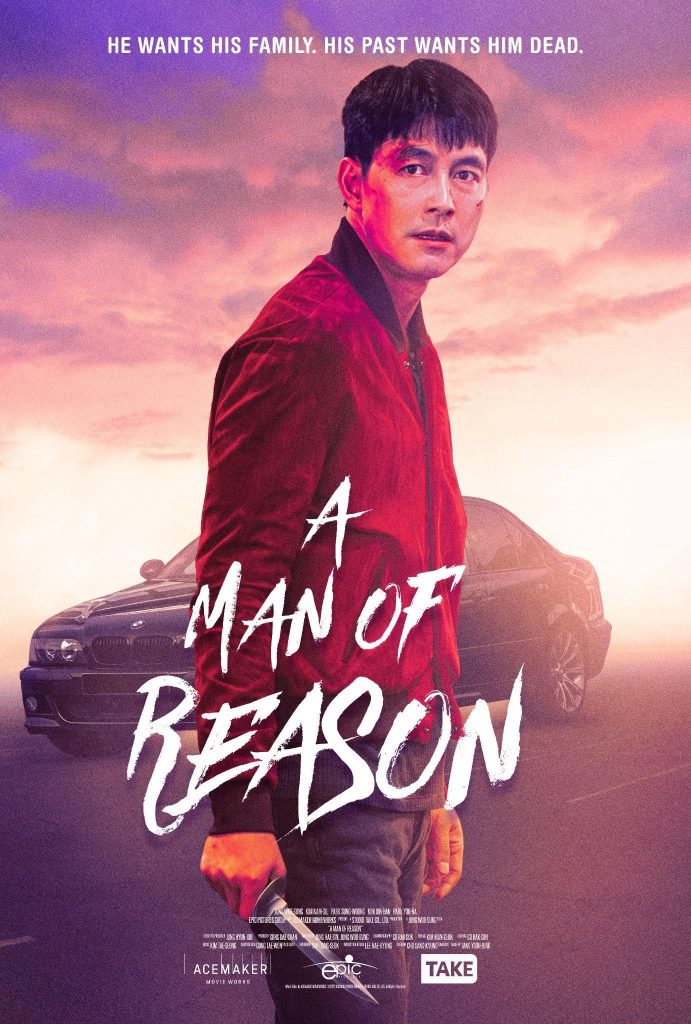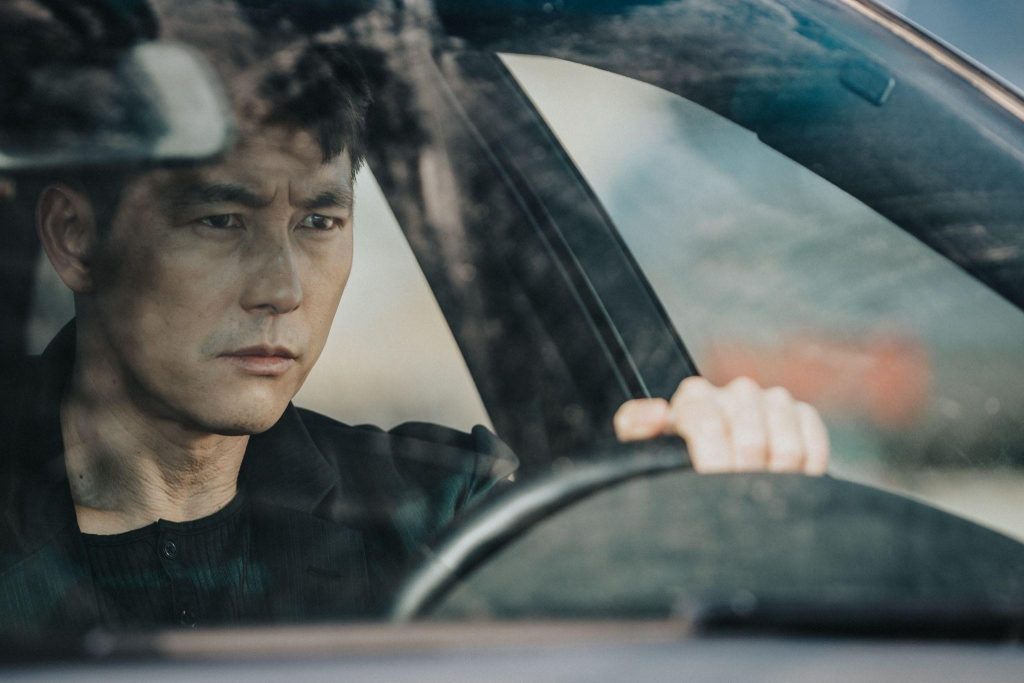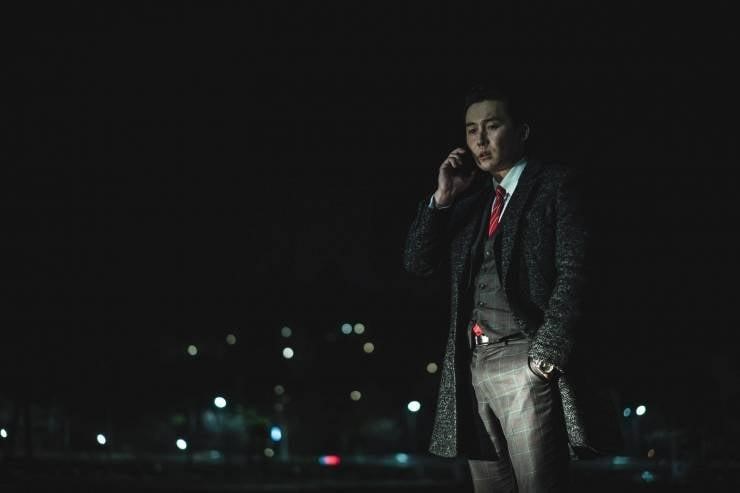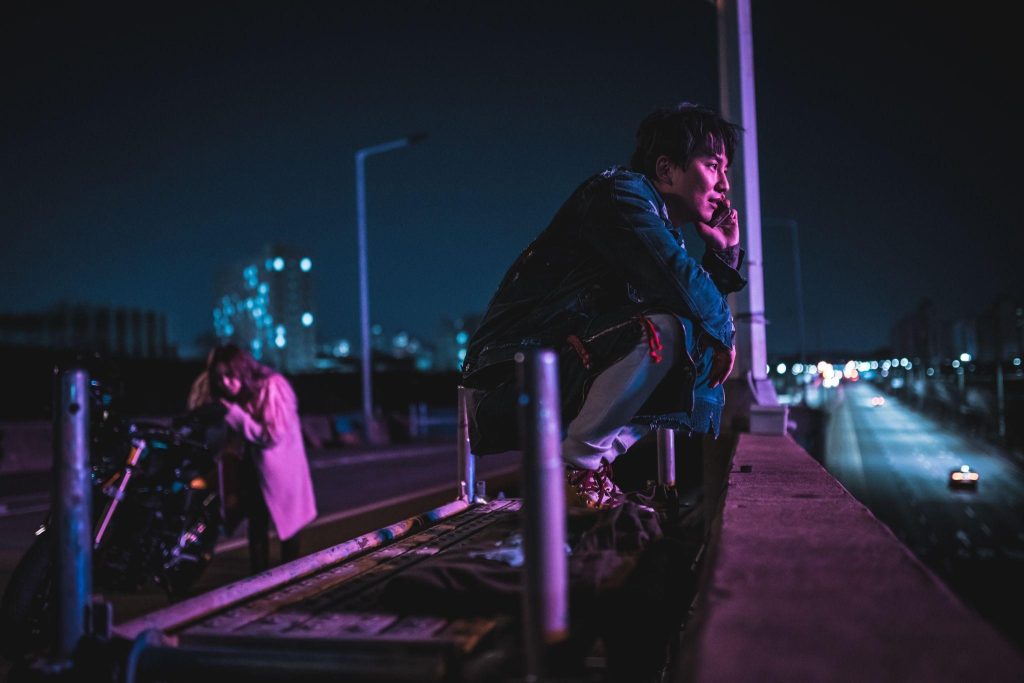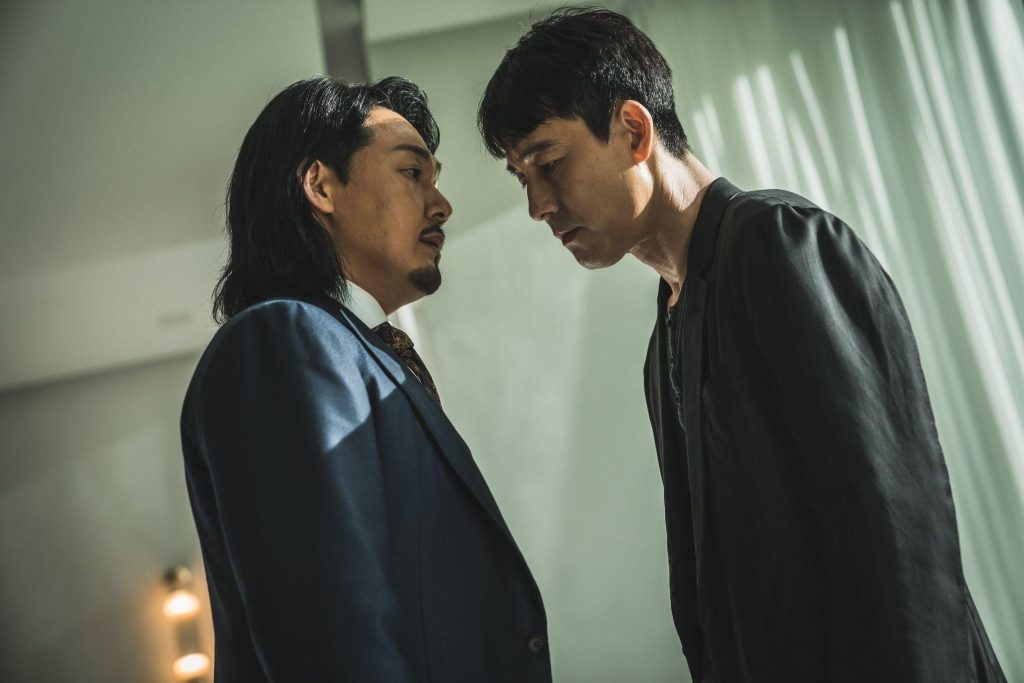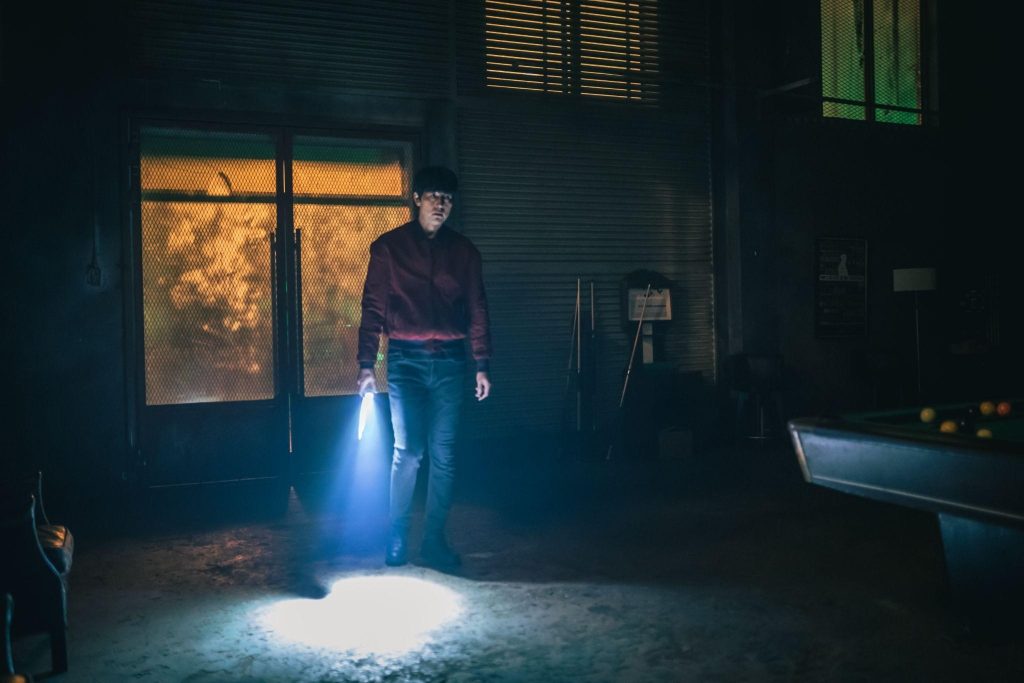Life is unpredictable in oh so many ways, and no matter what plans we make for the path we want to take to our individual goals, hurdles and obstacles that are challenging to get over or around can be tricky and difficult. But more often than not, those obstacles and some deviations provide us with the experiences we need to complete our goals even if we don’t see it at first.
For veteran Korean actor Jung Woo-sung, having over twenty years of experience in front of the camera playing a multitude of characters in practically every film genre, stepping behind the camera to direct various projects for commercials and music videos, and as a producer for his studio Artist Company — co-founded with Lee Jung-jae — prepared him to accept the challenge of directing his first feature as well as playing the lead for the action film A Man of Reason.
The film, which had its international premiere at the 2023 Toronto International Film Festival. Was written by Jung Hae-shin, A Man of Reason 보호자, is about a man Su-hyuk who thinking that after serving ten years in prison for his life would be different to the one he lead before. A life of extreme violence dictated by a ruthless crime boss who sees the men who work for him as a means to achieve his personal goals of vast wealth and a higher social status. Upon his release, So-hyuk is but a short distance on his path to a new beginning when it becomes evident that he’s going to have to step back into his old life to fully escape it.
In doing so he encounters many people who seek to prevent his escape.
In my interview with Jung Woo-sung he speaks about taking on the challenge of directing his first feature film, using color in the costuming as a reference to where Su-hyuk is in his life and his connection to his loved ones, and working with actors Kim Jun-han and Kim Nam-gil who played the film’s villains and Su-hyuk’s deadly and unpredictable obstacles.
Note: This interview was conducted via email. All references to the film title of “A Man of Reason” will be stated as “The Guardian” as it is the English translation of the official Korean title 보호자.
What was it about A Man of Reason and working with writer Jung Hae-shin that drew you to the story to not only direct it but to also take on the extra challenge of playing the lead character Su-hyuk?
First, before answering, I would like to thank the reporter for her in-depth questions with a deep understanding and interpretation of the film. Thank you.
For The Guardian, I didn’t participate in the creative process during the writing stage at first. Producer Song Dae-chan asked me to participate as an actor in the completed screenplay, which I accepted, and then the writer Jung Hae-shin, who was originally planning to direct the film, had to withdraw from the project due to personal issues, which led to the proposal that I should direct the film.
In fact, I had never met the writer, and my job was to adapt this clichéd scenario while keeping the personality that the writer wanted to put into it, and to change or add things from my point of view as a director. I had already tried my hand at directing music videos, short films, and brand films, and I had my heart set on directing a feature, but I never imagined that my first film would be The Guardian.
I‘ve always thought that directing should be faithful to the original idea of a script, but the clichéd scenario of The Guardian, was a different challenge. It seemed to me that many action movies were made similarly, having been based on the scenes of successful action movies that had already been completed and used as references for scene composition. So, it was like a homework assignment.
I felt like I was being asked the question, “Okay, this is a typical scenario, how are you going to make it?”
It’s a different challenge from participating only as an actor, as on top of that, it was a head-to-head challenge in a situation whereI wasn’t involved in the planning and writing process. I’m not usually one to shy away from challenges that come my way, so I think I responded without fear.
To get into the film itself now for a bit, I want to ask about the costume choices for Su-hyuk and his ex-girlfriend Min-seo played by Lee Elijah. In the opening sequence we see Su-hyuk walking into the deserted quarry wearing a forest green bomber jacket and black clothing beneath, echoing the green that inmates wear in Korean prisons, and when we first see Min-seo during her conversation with him, she’s also wearing shades of green. The dark green top and a mint green coat.
Because of this, I wondered if perhaps you and the costume designer spoke about Min-seo’s clothing reflecting how she was impacted by Su-hyuk’s ten-year absence. That while she was free, her life in some sense was placed on hold with him
There’s an old Korean saying, “It’s better to understand than to dream.”, and I think that’s exactly what your interpretation is here.
It was definitely the wardrobe director’s intention to connect the two characters’ similarities through color. It was a coincidence that the prison uniforms were in a similar color family, and I think that coincidence created a very clever meaning.
In fact, I find this coincidence interesting. Some ‘meanings’ have been intentionally created and presented, but they’re also created by the different perspectives and understandings of the people who receive them. They’re also created very ‘accidentally’ by some impulse, so sometimes I’m worried and cautious, “Will a meaning I don’t like be created by accident and conveyed?”, but it’s a wonderful experience to have these wonderful coincidental meanings come back in the question.
I imagined that Min-seo’s time began to come back to life when she reunited with Su-hyuk, and that her life was sustained and saved by her daughter, In-bi (Ryu Ji-an), whose presence served as her own mother’s guardian. That’s why I included the line “She made me an adult. A mother.” to Min-seo’s lines.
Of course, Min-seo is a strong person. She must have tried to protect and raise her child with pride by herself. However, she must have been exhausted and lonely whenever she endured and dealt with every little practical difficulty. Without Su-hyuk, Min-seo’s time in that loneliness must have been dark, and in some ways, she cut herself off from the world. In that sense, the color identity of Su-hyuk and Min-seo was a great job by the costume director.
As a character, Su-hyuk is very determined. He’s stoic, and from the action sequences, he’s very violent when he needs to be, but he’s also very caring towards those he genuinely cares for as seen in the scene with his friend Joon-ho played by Kim Joo-hun.
As the actor, how did you work out how you wanted to play these different sides to him, and was your process influenced by the way you wanted to direct the film, or did you let the way you wanted to play him inform your directing style for him?
It’s an interesting question. Well…I guess you could say it was a two-way influence, or maybe the way I wanted to act influenced the way I directed, because obviously when I was designing the character, I approached him as an actor first and envisioned that.
But as a director, I was thinking about what Su-hyuk’s will and what that would look like and how to capture it in him as a character.
It was a directorial choice to capture the level of violence that a man who has renounced violence has to again resort to that when a violent situation unfolds.
In particular, in the overseas festival version of the film, the scene on the 13th floor of the hotel and the final confrontation with Eun-guk were directed with the idea that Su-hyuk must completely renounce violence. Because only then can he become an upright protector of In-bi and her future.
In talking about characterization, I’m intrigued by Sung-joon and Woo-jin who I think are both perfectly and very interestingly performed by Kim Jun-han and Kim Nam-gil. These two characters are intriguing to me because they’re both villains and antagonists of Su-hyuk but in very different ways because of their individual motivations and the performance styles of both actors.
Kim Jun-han played Sung-joon as someone who is very needy of approval of his gang boss turned CEO, Eung-kook (Park Sung-woong), the other subordinates, and I think also Su-hyuk. It’s clear the envy and hate are there, but so is the desperate hope of being seen as just as important and as impressive. It’s all of these things, his insecurities that make him just as unpredictable and dangerous as Woo-jin.
Talk about working with Kim Jun-han, and perhaps writer Jung Hae-shin on how you wanted this character to come to life.
The character of Sung-joon is the person I changed the most in the adaptation of the script. In fact, the events of The Guardian began with Sung-joon’s own anxiety to be recognized – “The ace of my former organization is back!” is where the anxiety begins with his interactions with Eung-kook.
I think it’s all about creating situations out of individual feelings, and sometimes those feelings start with very trivial and ridiculous things.
Jun-han had worked with me in one of my previous productions, and although we didn’t have any scenes together, I was impressed with his performance in the scenes he was in, so when I started working on the adaptation, I wanted to use him as a reference for Sung-joon. I thought it would be interesting to see how his delicate performance would play out when he encounters certain feelings of anxiety. He was very receptive to the idea, and we had a lot of fun working together.
I think that’s something I learned while preparing for the film, because he’s an actor who usually comes to the set with a lot of preparation, and I think I shook him up with improvisational demands on set, and I think that was an important part of creating Sung-joon. I wanted him to be a character who has some kind of anxiety that we could sympathize with. I wanted Sung-joon to be a character who, even though he’s a villain, could receive compassion because of that vulnerable psychological expression.
Just as Sung-joon has all of these complex layers to him, so too does Woo-jin. He has the same unpredictably dangerous nature and is also impressed by Su-hyuk even if he hates having to admit it. But unlike Sung-joon, Woo-jin behaves more like a willful teenager, almost to the point of being annoying. This makes him dangerous because he becomes violent out of spite and takes glee in it.
Discuss what the process was with Kim Nam-gil to figure out how to balance the tone of this character because he had to be careful not to veer too close to being the wrong side of comical in a way that wouldn’t work with the overall tone of the film.
Actor Kim Nam-gil usually approaches me as a very cute boy. When he received the actual script, the first thing he said to me was, “I’m going to do it like I’m doing it in front of my brother, right?” After that, I was careful not to show any calculated breathing in the scene.
Woo-jin is someone who is stuck in the past, and in that boyishness, I wanted to point out how trivialized violence is in the modern world and how modern society consumes violence as entertainment through games or the news.
There must have been some event that made Woo-jin unhappy, and since he is directly or indirectly connected to that event, he tries to escape from the memory of it but can’t, so he is stuck in that time. Then he meets Su-hyuk, who has an unknown darkness to him, and Woo-jin observes and becomes intrigued by him, and finally confesses to him about his past events as if in a confessional. I wrote the dialogue for that scene with the idea that the sincerity of the confession could balance the ridiculousness of Woo-jin’s character with a heavy weight.
Once again, I would like to take this opportunity to thank actor Kim Nam-gil for his exquisite portrayal of the character’s emotions, which is not easy to do.
While A Man of Reason is what I would call a very straightforward action film with a plot that’s easy to follow, I think there are particular scenes that show not only the different sides to the characters, but I think also Korean society and where it is now economically.
There’s a scene at the end of the 2nd act where Eung-kook is looking out the window of his office in the high rise and in the distance all that can be seen are the bright lights of the city. The homes, offices, and high rises just like the one Eung-kook is building and hoping to have become a veritable gold mine.
In the distance hovering over the city is a giant blimp announcing the grand opening of this skyscraper, and it reminded me of a particular scene in one of my favorite films Children of Men by Alfonso Cuarón, that references to how powerful men in their skyscrapers, modern day castles, looking down on the people below them figuratively and metaphorically with disdain, even though it was those same people who built the castles for them to look down from.
People who pursue profit alone are oblivious to the violence they’re doing to others, so when Eung-kook says to Woo-jin, “Do what you’re told, don’t think about it,” he’s saying that even though Woo-jin is next to him in the same castle, wearing the best fabrics, you can’t hide who you are. He can’t shake the underlying anxiety about his own existence.
Telling humans not to think is like telling them to exist as part of themselves, not as a whole individual, and in the end, the man who said it is himself is trapped in a dangerous castle where he is losing his personality.
Perhaps I read too much into that scene with Eung-kook, but I read it as you and writer Jung Hae-shin making room in the film for social commentary on capitalism and classism. Was I right? And if so, could you speak on how using action films work as a way to discuss those themes without making it explicitly obvious to the audience?
This scene was also added in the adaptation. The desire for power and material things should be different from our animalistic desires. It should be rationalized and approached with mature thinking. However, in real life, the desire is so primal that it’s not much different from a male’s desire to please only themselves, so we created the scene where Woo-jin is introduced.
This is a totally nerdy question, but I have to ask. After Min-seo and Su-hyuk’s car is struck, she’s seen lying unconscious in the passenger seat. As the camera holds on her there’s a slight delay before the blood begins to flow from her head, as though giving the audience and Su-hyuk hope that the worst possible scenario hasn’t occurred.
I wanted to know if the delay in the bleeding was specifically timed to give that sense of false hope, and how did you and the director of the makeup department determine how many seconds were the right amount for that moment of suspense.
That’s a very good question. That moment is the magnitude of the guilt that Su-hyuk is throwing at him. It’s a moment that no one wanted, not Woo-jin, not Jin-ah, not even Sung-joon, the man who commissioned the job. But it happens, and Su-hyuk is the only one who has to deal with the guilt of it. It’s a very long moment that can feel like a lifetime for Su-hyuk. The length of that moment was determined by the editing.
How much fun was it for you to work out those smaller details like the costuming, and scenes like Sung-joon holding the head of the statue in his hands – which I thought was a rather poetic reference to how monarchs and oligarchs were punished for mistreating citizens and using the flashlight during the first major fight sequence. I thought it was a great way to make the fight dynamic and convey just how skilled and efficient Su-hyuk was.
I am truly happy and grateful that you took it as a poetic metaphor. I wanted to depict a response that uses both physical and psychological means of violence in a way that seems intuitive, a satirical look at how the violence inflicted by humans who have become desensitized to it can be so horrific that it makes the person on the receiving end look ridiculous.
The flashlight action was shot after the main shoot was over. We wanted to quickly establish the location and time to show how used to violence Su-hyuk was in the past, and then realized that he needed to have a light in his hand to fight the darkness as a weapon. The result was a very effective scene that we were very happy with.
Since 2023 with A Man of Reason you’ve had a couple projects released. 12.12: The Day and Tell Me That You Love Me. Can you tell me how having the experience of directing has made you appreciate your own work as an actor, and how it may have changed how you see not only directing but the responsibilities of all the heads of departments and the dozens of people working on film sets, too?
I’m a very lucky person. I was very lucky to fulfill my dream of becoming an actor, and when I went to my first set, everything was new to me. From then on, whether I had a part or not, I would often stay on set and observe the work of the crew around me, and that’s how I got used to working in movies and dreamed of directing.
The field is the place that teaches me everything and I know that the work of every department is very important to complete the movie.
This interview has been edited for length and clarity. Click here to watch my interview with producer Song Dae-chan of STUDIO Take.
— Carolyn Hinds
Freelance Critic, Journalist & Podcaster
African American Film Critics Association Member, Tomatometer-Approved Critic
Co-Host & Producer So Here’s What Happened! Podcast
Bylines at http://Authory.com/CarolynHinds
Twitter & Instagram: @CarrieCnh12
A Man of Reason 보호자 is now available on DVD, VOD, and On Demand, and is distributed by Epic Pictures.
#KCrush #AManofReason #TheGuardian #TheProtector #JungWooSung #KimNamGil #KimJu-Han #KoreanFilm #보호자 #정우성감독 #김남길 #박성웅 #김준한 #박유나 #블루레이 #KoreanCinema #StudioTake #TIFF2023 #ActionFilm #KoreanDirector #ActionDramas #EpicPictures #EpicpicturesGroup

